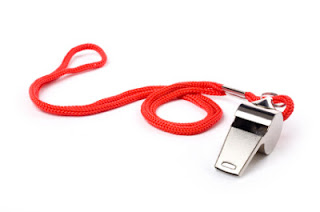Monday, February 6, 2012
An Accountability Coach Can Help You Get Results
Do you have an area in your life that you need to improve, but for some reason you’ve lacked the motivation or commitment to make the change? Maybe it’s being more productive at work or scheduling more time with your family. For your long-term health, you may want to establish a regular exercise program or eat more nutritious foods.
It’s the rare person who can change a habit or master a new skill without the aid of a coach or support system. All athletes have a coach who shows them how to do the skill the right way, gives feedback, and offers encouragement along the way.
One of the most effective strategies you can implement is to get yourself an accountability coach. This is someone who will hold your feet to the fire to make sure you do what you say you’ll do.
You want to choose this person carefully. You have to be able to count on your coach to keep appointments and be committed to your success. Because you may expose your imperfections and vulnerabilities along the way, there also needs to be strong trust. And your coach needs to know how to give encouragement since you’re likely to hit some rough spots along the way.
Schedule daily or weekly contacts, whatever works best for both of you. Just make sure it’s often enough that you’re motivated to take action and make real progress between phone or in-person conversations.
Be clear about what you want your coach to hold you accountable for. You can even create the questions you want the person to ask you.
In his book, What Got You Here Won’t Get You There, Marshall Goldsmith describes how he works with his own accountability coach. His coach calls him every night, no matter where he is in the world, and asks him a series of 12 questions that Marshall gave him. Here are just a few:
- How happy are you?
- How much walking did you do?
- How much time did you spend writing
- How many times did you try to prove you were right when it wasn’t worth it?
These questions keep Goldsmith focused on aspects of his life that he’s identified as important. They serve to keep him on track as he goes through his day, because he’s keenly aware of the answers he'll have to give later.
You may have just one area you want to improve. In that case, you can structure just a few questions for your own coach to ask you. Here are a couple of examples to stimulate your thinking:
To get more done in your work:
- How many hours of uninterrupted time did you devote to your #1 priority project?
- How often did you check email and phone messages?
- Did you let anyone call you or come into your office and just chat without an appointment?
To become more physically fit:
- How much time did you spend on cardio workouts?
- What strength training did you do?
- Did you eat at least 6 fruits and vegetables?
- How many high-fat foods did you eat?
In the opening words of one of my favorite books, The Road Less Traveled, author Scott Peck states that “Life is difficult.” As you grapple with the challenges you’ll inevitably face on your journey, you’ll find the path easier to navigate with an accountability coach – someone who will support you and make sure you follow through on your commitments.
Subscribe to:
Post Comments (Atom)






Interesting post! Thanks.
ReplyDelete